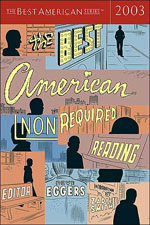[Transcribed discussion of “Catching Earl,” by Ryan Stone, published in Natural Bridge.
In this story, a man named Ted participates in an anger management group at the local Methodist Church. Ted used to beat his wife, but these days he’s sadder and older and trying to keep things under control. Across the street from him live Earl and his wife, Susan. They are younger and Ted suspects Earl abuses Susan. Ted decides to make it his mission to get Earl to come to the anger management group.]
Adrianne: This story really stood out for me. I always find these kinds of group settings interesting. Support groups, “Hi, my name is Earl”—that kind of thing. I don’t know how to describe why I liked it so much. I guess because it was very straightforward. The language wasn’t hard. I just like looking at people and hearing their stories and their background. This story let me do that.
Molly: I liked getting to see inside Ted. To see his progression from being someone who beats his wife to being the sad old man in the neighborhood. That was interesting. He used to be really angry and then he just kind of retreated into himself. Except he reaches out to Earl.
Yael: I felt for Ted. Once he exhausted all his rage he just got really sad.
Fiona: I thought that the simplicity of the writing worked well in this story. I really felt for both of them. For Ted and Earl. And especially Earl because he’s a lot younger, and he’s having so much tension with his wife.
Bora: There were certain sentences I highlighted that were great. Like this one on page 77: “Steak offers him a hand, trying to preserve trust, but to no avail because when something bigger than you asks you to trust it, it’s just a little too damn heavy.”
[Steak is the nickname for another man in the group. Ted and Steak are partners in “the old fall-into-your-partners’-arms-game” during one session in the basement of the church.]
Virginia: This sentence on page 80 was my favorite: “The tree blooms once a year in spring, and when it flowers it smells wonderful, like sweet apple spice, and the blooms are light pink, the color of a baby’s cheek.”
Bora: Actually, I was wondering about all the tree references. There are lots of trees in this piece—pecan, crab apple, chestnut… Why is that?
Roxie: I thought that was connected to this whole thing about how trees age and give something back. Like how the tree in front of Ted’s house is the prettiest on the block but only for a couple weeks. It only blooms for that long. I think he thought of his mission with Earl that way—something he could give the world, even if it was a small thing.
Bora: It’s like The Giving Tree.
[Ted succeeds in convincing Earl to come to the anger management group. The students were asked what they thought of this: Is Ted trying to save himself by saving someone else? Is Earl beyond repair?]
Tanea: Yeah, I think Ted was trying to save himself by saving Earl.
Fiona: But I don’t think Earl is beyond repair. Ted wants to help him before it’s too late.
Bora: It seemed like Ted was just trying to be Earl’s father figure. He wanted to help Earl before Earl turned into a sad old man, too.
[In the story’s final scene, Ted and Earl are at the support group. They are partners. Ernie has again instructed everyone to play “the old fall-into-your-partners’-arms-game.” Earl falls into Ted’s arm but Ted can’t keep his footing. They both fall. The story ends. The students were asked what they made of this finish.]
Tanea: When they both fell—it says, “they tumble, both of them, to the ground”—I think it represents united struggle. It represents how they are connected. They go down together.
Yael: I took it differently. I saw it as a control thing. Ernie had said that this game was about control. Ted and Earl were both out of control. The author is saying that you can’t save someone else from being out of control if you’re out of control yourself.
Adrianne: I think it’s a good ending because it keeps you questioning.
Subscribe to:
Post Comments (Atom)









No comments:
Post a Comment